- Home
- Ernest Hemingway
Islands in the Stream Page 43
Islands in the Stream Read online
Page 43
“I know it. I’m going down in the afterhatch as soon as Ara loads Peters.”
“He better load him by himself,” Willie said. “They could see silhouettes. But they couldn’t make out an object flat on the deck without glasses.”
Thomas Hudson explained to Ara and Ara climbed up and handled Peters quite easily and impersonally but he knotted the cloth behind his head. He was neither tender nor rough and all he said as he lifted him and slid him head first into the dinghy was, “He is very rigid.”
“That’s why they call them stiffs,” Willie said. “Didn’t you ever hear?”
“Yes,” Ara said. “We call them fiambres which means cold meats as in a restaurant when you can have fish or cold meats. But I was thinking of Peters. He was always so limber.”
“I’ll get him right back, Tom. Do you need anything?”
“Luck,” Thomas Hudson said. “Thank you for the recon, Willie.”
“Just the usual shit,” Willie said.
“Have Gil put Merthiolate on the scratches.”
“Fuck the scratches,” Willie said. “I’m going to run as a jungle man.”
Thomas Hudson and Henry were looking out from the two hatches toward the broken and indented line of keys that lay between them and the long bay that formed the inland channel. They spoke in a normal tone of voice since they knew the others could not be closer than those small green islands.
“You watch,” Thomas Hudson said. “I’m going to throw that ammunition of theirs overboard and have another look around below.”
Below he found several things he had not noticed before and he lifted the case of ammunition out onto the deck and pushed it over the side. I suppose I should have scattered all the cartons, he thought. But the hell with it. He brought up the Schmeisser pistol and found it was not functioning. He laid it down with his own stuff.
I’ll let Ara break it down, he thought. At least we know why they did not take it with them. Do you suppose they left that wounded man behind just as a reception committee and pulled out? Or do you suppose they made him comfortable and went off for a recon? How much do you think they saw and how much do they know?
“Don’t you think we might have kept that ammo for evidence?” Henry asked.
“We’re way past the evidence stage now.”
“But it’s always good to have it. You know how stuffy they are and they’ll probably just evaluate the whole thing as doubtful. Maybe ONI won’t even give it a doubtful. Do you remember the last one, Tom?”
“Yes, I remember.”
“She went all the way up the mouth of the Mississippi and she’s still doubtful.”
“That’s correct.”
“I think we might have kept the ammo.”
“Henry,” Thomas Hudson said. “Please take it easy. The deads from the massacre are on the key. We have Schmeisser bullets from them and from the dead Kraut. We have another dead Kraut buried with the location in the log. We have this turtle boat sunk and a dead Kraut in her bows. We have two Schmeisser pistols. One is nonfunctioning and the other is smashed by the frag.”
“A hurricane will come along and blow everything away and they will say the whole thing is doubtful.”
“All right,” said Thomas Hudson. “Let’s concede the whole thing is doubtful. And Peters?”
“One of us probably shot him.”
“Sure. We’ll have to go through all that.”
They heard the outboard and then saw Ara round the poult. That dinghy rides as high in the bow as a canoe, Thomas Hudson thought.
“Get your junk together, Henry,” he said. “We’re going back to the ship.”
“I’m glad to stay aboard this thing if you want me to.”
“No. I want you on the ship.”
After Ara came alongside Thomas Hudson changed his mind.
“Stay here, Henry, a little while and I’ll send Ara for you. If they come out, get a frag into the skiff if they come alongside. Take this back hatch where you have lots of room. Use your head.”
“Yes, Tom. Thank you for letting me stay.”
“I’d stay and send you in. But I have to talk things over with Antonio.”
“I understand. Shouldn’t I fire on them when they are alongside before I throw the frag?”
“If you want. But keep your head down and then throw the frag in from the other hatch. And hold it all you can.”
He was lying in the lee scuppers passing his things to Ara. Then he lowered himself over the side.
“Is there too much water for you down there?” he asked Henry.
“No, Tom. It’s quite all right.”
“Don’t get claustrophobia and keep a good lookout. If they come in, let them get right alongside before you make your play.”
“Of course, Tom.”
“Think of it as a duck blind.”
“I don’t have to, Tom.”
Thomas Hudson was lying flat on the planking of the dinghy now.
“Ara will be back as soon as you ought to come in.”
“Don’t worry, Tom. I can stay here all night if you like but I’d like Ara to bring out something to eat and a little rum perhaps and some more water.”
“He’ll be back and pick you up and we’ll have a little rum on board.”
Ara pulled the cord on the motor and they headed for the ship. Thomas Hudson felt the frags along his legs and the weight of the niño across his chest. He put his arms around it and cuddled it and Ara laughed and leaned down and said, “This is a bad life for good children.”
XIX
They were all on board the ship now and it was cool in late afternoon wind. The flamingoes were gone from the flat although it was still uncovered. The flat was gray in the afternoon light and there was a flock of willets working over it. Beyond was the shallow water, the channels that could not be seen for the mud, and in the background were the keys.
Thomas Hudson was standing now on the flying bridge, leaning against a corner of it, and Antonio was talking to him.
“We don’t get a high tide until after eleven tonight,” Antonio said. “This wind is emptying the water right out of the bay and the flats and I don’t know what sort of depths we will have.”
“Will it float her or will we have to kedge off?”
“It will float her. But we haven’t any moon.”
“That’s right. That’s why we have these big springs.”
“She only made last night,” Antonio said. “She’s new. We didn’t see her last night because of the squall.”
“That’s right.”
“I sent George and Gil in to cut some brush to stake the channel so we can get out. We can always sound it with the dinghy and get stakes on the points.”
“Look. What I’d like to do when she floats is get in to where I can bring the searchlight and the .50’s to bear on the turtle boat and put somebody on board to blink to us if they come out in the skiff.”
“That would be ideal, Tom. But you can’t get in there in the dark. You could get in there with the searchlight and the dinghy sounding ahead of you and calling the soundings and staking. But nobody would come out then. They’d never come out.”
“I guess so, I’ve been wrong twice today.”
“You were wrong,” Antonio said. “But it was just chances. Like drawing a card.”
“What’s important is that I was wrong. Now tell me what you think.”
“I think that if they haven’t gone and if we make no move to act as though we were not aground they will come out to board the ship tonight. We do not look like anything except a pleasure craft. I’m sure they were inside the keys when it happened. They will feel contempt for us and they will be sure we are weak because they have seen only one man all day in the dinghy if they have watched.”
“We tried to play it that way.”
“Then if they find how things are on the turtle boat what then?”
“Ask Willie to come up here,” he said to Antonio.
Willie came
up, still lumpy-looking from the mosquito bites. His scratches looked better, though, and he was wearing only a pair of khaki shorts.
“How are you, jungle man?”
“I’m fine, Tom. Ara put some chloroform on the bites and they’ve stopped itching. Those damn mosquitoes are about a quarter of an inch long and black as ink.”
“We’ve got ourselves pretty well fucked-up, Willie.”
“Hell. We’ve been fucked-up from the start.”
“Peters?”
“We’ve got him sewed up in canvas and some ice on him. He won’t bring anything in the market. But he’ll hold a couple of days.”
“Listen, Willie. I was telling Antonio what I’d like to do was get in to where the .50’s and the searchlight would bear on that hulk. But he says we can’t get in without spooking the whole ocean and that it’s no good.”
“Sure,” Willie said. “He’s right. That’s three times you’ve been wrong today. I’m leading you by one less.”
“Do you think they will come out and try and board the ship?”
“I doubt it like hell,” Willie said.
“But they could.”
“They aren’t crazy. But they could be desperate enough to try it.”
The two of them were sitting on the deck of-the flying bridge leaning back against the stays and the canvas. Willie rubbed the part of his right shoulder that had begun to itch again on the canvas.
“They could come out,” he said. “They did a crazy thing when they made that massacre.”
“Not from their point of view then. You have to remember it was when they had just lost their ship and they were desperate.”
“Well, they lost another ship today as well as a comrade. Maybe they were fond of the son of a bitch.”
“Probably. Or they wouldn’t have let him take up space.”
“He was a pretty good guy,” Willie said. “He took all that surrender talk and a grenade before he even made his play. He must have thought Peters was the captain because of his commanding manner and the way he spreched Kraut.”
“I guess so.”
“You know the frags went off below decks. They might never have heard them. How many rounds did you fire, Tom?”
“Not more than five.”
“The character fired one burp.”
“How loud did it all sound to you, Antonio?”
“It didn’t sound loud,” Antonio said. “We are downwind and to the north of it with the key between. It didn’t sound loud at all. But I could hear it clearly.”
“They might never have heard it,” Thomas Hudson said. “But they must have seen the dinghy running around and their ship careened. They’re sure to think she’s a trap. I don’t think they will go near her.”
“I think that’s right,” Willie agreed.
“But do you think they’ll come out here?”
“You and God know just as much about that as I do. Aren’t you the one who’s always thinking in the Germans’ minds?”
“Sure,” Thomas Hudson said. “Sometimes I’m pretty good at it. But I’m not so hot today.”
“You’re thinking all right,” Willie said. “You just ran into a bad streak.”
“We could set a trap over there.”
“You’re just as trapped as you’re trapping on her,” Willie said.
“You go over and booby-trap her while it’s still light.”
“Now you’re talking,” Willie said. “That’s the old Tom. I’ll booby-trap both hatches and that dead Kraut and the lee rail. You’re thinking your way out of it now.”
“Use plenty of stuff. We’ve got lots of stuff.”
“She’ll be booby-trapped till Christ won’t have her.”
“They’re coming in with the dinghy,” Antonio said.
“I’ll get Ara and the necessary and get over there,” Willie said.
“Don’t blow yourself up.”
“Don’t think too much,” Willie said. “Get some rest, Tom. You’re going to be up all night.”
“So are you.”
“The hell I am. When you want me they can wake me.”
“I’ll take the watch,” Thomas Hudson said to Antonio. “When does our tide turn?”
“It’s turned already but it is fighting with the current that the strong east wind blows out from the bay.”
“Put Gil on the .50’s and give George a break. Tell everybody to get a rest for the night.”
“Why don’t you take a drink, Tom?”
“I don’t want one. What are you giving them to eat tonight?”
“A big piece of that wahoo boiled with Spanish sauce and black beans and rice. There aren’t any more canned fruits.”
“There were some on the list at Confites.”
“Yes. But they were crossed off.”
“Do you have any dried fruits?”
“Apricots.”
“Soak some tonight and give them to them for breakfast.”
“Henry won’t eat them for breakfast.”
“Well, give them to him the first meal he eats well. Have you plenty of soup?”
“Plenty.”
“How is ice?”
“We have plenty for a week if we don’t use too much on Peters. Why don’t you bury him at sea, Tom?”
“Maybe I will,” Thomas Hudson said. “He always said he’d like it.”
“He said so many things.”
“Yeah.”
“Tom, why don’t you take a drink?”
“All right,” said Thomas Hudson. “Do you have any gin left?”
“Your bottle is in the locker.”
“Do you have any water coconuts?”
“Yes.”
“Make me a gin and coconut water with some lime in it. If we have limes.”
“We have plenty of limes. Peters has some Scotch of his hidden if I can find it. Would you rather have that?”
“No. Find it and lock it up. We might need it.”
“I’ll make yours and hand it up.”
“Thank you. Maybe we’ll have good luck and they will come out tonight.”
“I can’t believe they will. I am of the school of Willie. But they might.”
“We look awfully tempting. And they need some sort of craft.”
“Yes, Tom. But they are not fools. You would not have been able to think in their heads if they were fools.”
“OK. Get the drink.” Thomas Hudson was glassing the keys with the big binoculars. “I’ll try to think in their heads some more.”
But he did not have any luck thinking in their heads. He was not thinking very well at all. He watched the dinghy, Ara in the stern and Willie out of sight, round the point of the key. He watched the flock of willet fly up finally and turn and head for one of the outer keys. Then he was alone and he sipped the drink that Antonio had made.
He thought how he had promised himself that he would not drink this trip, not even the cool one in the evening, so that he would not think of anything but work. He thought how he had planned to drive himself so he would sleep completely exhausted. But he made no excuses for this drink nor for the broken promise.
I drove myself, he thought. I did that all right. Now I might as well have this drink and think about something besides those other people. If they come out tonight we’ll have everything set for them. If they do not come out, I will go in after them tomorrow morning on the high tide.
So he sipped the drink, which was cold and clean-tasting, and he watched the broken line of the keys straight ahead and to the westward. A drink always unlocked his memory that he kept locked so carefully now and the keys reminded him of the days when they used to troll for tarpon when young Tom was a small boy. Those were different keys and the channels were wider.
There were no flamingoes but the other birds had been nearly all the same except for the flocks of big golden plover. He remembered the seasons when the plover were gray and the others when the black feathers had the golden tinge and he remembered young Tom’s pride
at the first one he had ever brought home when he had his first single barrel twenty-gauge. He remembered how Tom had stroked the plump white breast and touched the lovely black under-markings and how he had found the boy asleep that night in his bed with his arms around the bird. He had taken the bird away very softly hoping he would not wake the boy. The boy did not wake. His arms just closed up tightly and he rolled onto his back.
As he had taken the golden plover into the back room where the icebox was, he felt he had robbed the boy of it. But he had smoothed its plumage carefully and laid it on one of the grilled shelves of the icebox. The next day he had painted young Tom a picture of the golden plover and the boy had taken it with him when he went off to school that year. In the picture he had tried to get the fast, running quality of the bird and the background was a long beach with coconut palms.
Then he remembered one time when they were in a tourist camp. He had wakened early and Tom was still asleep. He lay on his back with his arms crossed and he looked like the sculpture of a young knight lying on his tomb. Thomas Hudson had sketched him that way using a tomb that he remembered from Salisbury Cathedral. He was going to paint a canvas of it later but he did not do it because he thought it could be bad luck. A lot of good that did, he thought.
He looked Into the sun that was low now and he could see Tom high up in the sun in a Spitfire. The aircraft was very high and very tiny and it shone like a fragment of broken mirror. He liked it up there, he said to himself. And it was a good rule you made about not drinking.
But over half of the drink was still in the paper-wrapped glass and there was still ice in it.
Courtesy of Peters, he thought. Then he remembered when they lived on the island in the old days and how Tom had read about the ice age at school and he was afraid it would come again.
“Papa,” he had said. “That is my only worry.”
“It can’t hit here,” Thomas Hudson had said.
“I know. But I can’t stand to think what it will do to all those people in Minnesota and Wisconsin and Michigan. Even Illinois and Indiana.”
“I don’t think we really have to worry about it,” Thomas Hudson had said. “It’s a dreadfully slow process if it comes.”
“I know,” young Tom had said. “But that’s the only thing I every really worry about. That and the extinction of the passenger pigeon.”

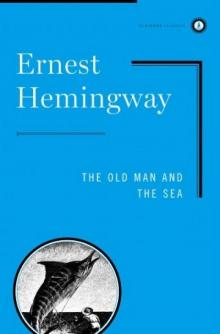 The Old Man and the Sea
The Old Man and the Sea Green Hills of Africa
Green Hills of Africa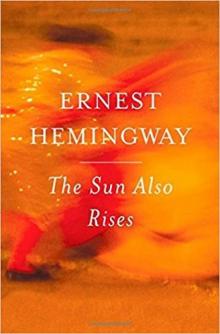 The Sun Also Rises
The Sun Also Rises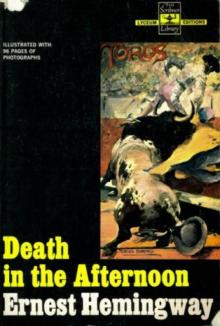 Death in the Afternoon
Death in the Afternoon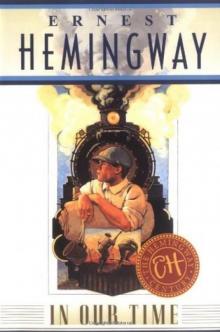 In Our Time
In Our Time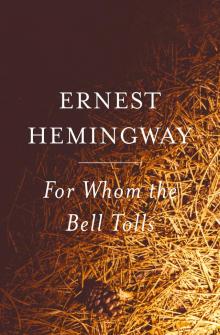 For Whom the Bell Tolls
For Whom the Bell Tolls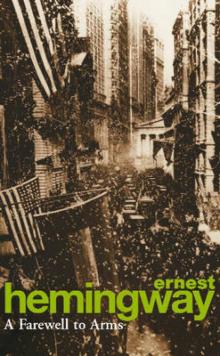 A Farewell to Arms
A Farewell to Arms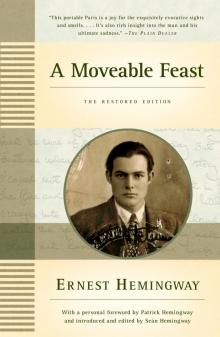 A Moveable Feast
A Moveable Feast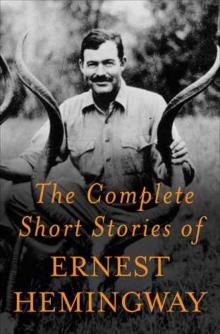 The Complete Short Stories of Ernest Hemingway
The Complete Short Stories of Ernest Hemingway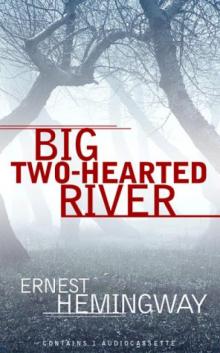 Big Two-Hearted River
Big Two-Hearted River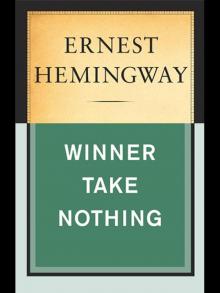 Winner Take Nothing
Winner Take Nothing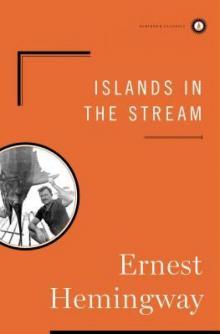 Islands in the Stream
Islands in the Stream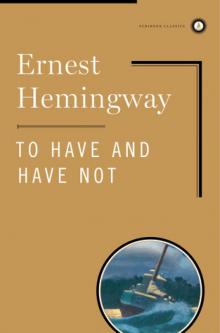 To Have and Have Not
To Have and Have Not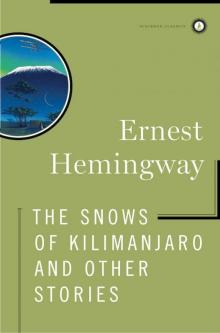 The Snows of Kilimanjaro and Other Stories
The Snows of Kilimanjaro and Other Stories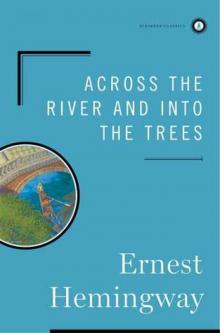 Across the River and Into the Trees
Across the River and Into the Trees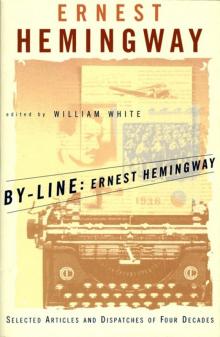 By-Line Ernest Hemingway
By-Line Ernest Hemingway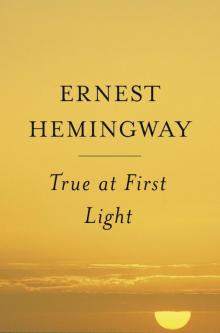 True at First Light
True at First Light Men Without Women
Men Without Women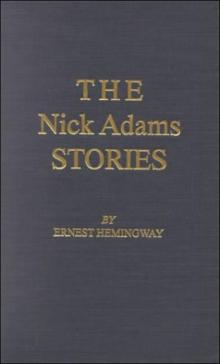 The Nick Adams Stories
The Nick Adams Stories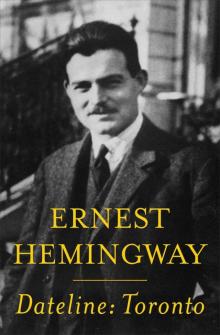 Dateline- Toronto
Dateline- Toronto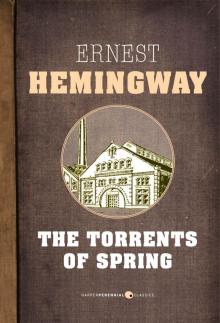 The Torrents of Spring
The Torrents of Spring Short Stories
Short Stories